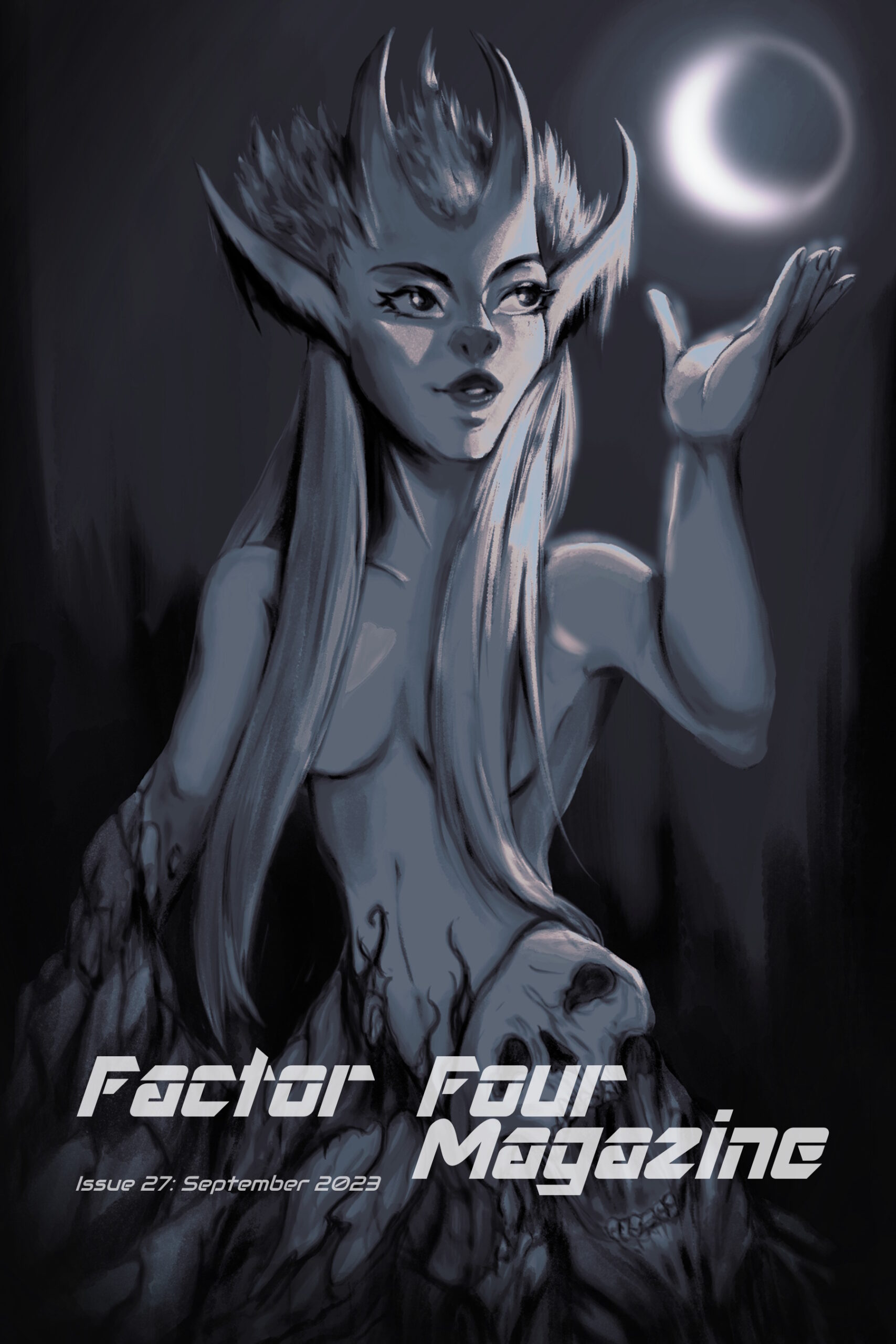But It Was Not Rain by Zach Shephard

The villagers would do anything to see rain again, even if it meant wounding a god.
They’d tried begging their sky deity to end the drought, but his clouds had simply hung above, as idle and gray as the nearby mountain. Their next prayer was less reverent.
Gathered in a dead yellow field, the villagers called once more to Kobus, King of all Clouds. They assailed him with guilt, telling stories of loved ones lost to the drought.
A rumble resonated overhead, as though Kobus himself were dragging a chair over to listen. The villagers redoubled their efforts. They shook loose a reply.
The droplets came scarcely at first: a patter here, a moved blade of grass there. As the frequency increased, the ecstatic villagers tilted their heads back and opened their mouths, arms wide.
Black fluid fell on their tongues, leaving a bitter, stinging taste. Once-relieved faces twisted into portraits of disgust. The deluge was nearly what they had hoped for, but it was not rain.
Spitting darkness, the villagers fled. They gathered inside a cabin, cursing as they brushed filth from their bodies. “It’s the southern wind all over again,” one said. “She stopped blowing decades ago, and never came back. We can’t let the rain abandon us too.”
The mob barked their support, save for one young woman: Zala. She was more interested in the storm outside the window, staining the earth black. It was a sign of life from the clouds, but it was not rain.
Behind her, the group planned their next appeal to Kobus. It would not be so gentle as the last.
Displeased with the village’s direction, Zala set out to solve the drought herself. It was half a day’s hike up the mountain. Outside a craggy cave, she met the hermit.
The old man picked his way across loose shale, leaning on a crooked stick. His eyes were clouded gray, his brows wispy. He coughed wetly into his shoulder, where his tunic was stained black.
“They say you’re the closest to Kobus,” Zala said. “You must know why the rain stopped.”
The hermit nodded. “The clouds rained for years without cease, but such behavior is harmful to the spirit. They finally willed their way out of it.”
“Then we’ll will them back. We almost did yesterday.”
“Oh?”
Zala scanned the ground; it had been spared the black deluge. “It didn’t reach you, but we summoned darkness from the sky. We’re close. What do we need to change?”
The hermit sighed, and in his face Zala saw a familiar sorrow: the sort of sadness that comes only with exhumed memories.
“Before your time,” he said, “the southern wind visited this place often. Then, one day, she stopped—and nothing could be done to bring her back. These things have happened before, and in a world so cruel, it’s no surprise they’ve happened again.” He coughed more blackness onto his shoulder, wiped his mouth. “So how do you make the rain return? That’s simple: you don’t.” He stepped into the cave and was gone.
Descending the mountain in defeat, Zala thought about her lover, whom she’d lost to the drought. After months of weeping, she’d finally managed three straight days without a tear.
A trickle touched her cheeks, but it was not rain.
The villagers rose early and returned to the field. Zala observed, despite her reservations.
An elder called forth the strongest of the village’s fighters. He was given a silver-tipped javelin, which he hurled toward the heavens. So powerful was his throw that the weapon pierced the clouds, opening a wound in the sky’s gray flesh. Everyone cheered.
Hearing the excitement, children rushed out to play in the ensuing downpour—but it was not rain.
Hot blood streaked their faces, falling from above. Screams and panic prevailed. Everyone retreated to the cabin.
While the angry mob plotted against Kobus, Zala helped clean the children. The boy she was working on coughed up a string of black fluid.
“It’s fine,” a nearby nursemaid said. “He spent too much time in yesterday’s downpour, but he’s getting better.”
Realization struck Zala: the boy wasn’t the only one coughing up darkness. The hermit had, too. Except his lands hadn’t been touched by the storm.
Zala rushed outside, toward the mountain. She felt the spillage of a wounded cloud, but it was not rain.
Covered in the sky’s drying blood, a panting Zala reached the hermit’s cave. He emerged.
“You’re bleeding,” Zala said, pointing. “I knew it.”
The hermit hid his reddened forearm.
“I’m sorry,” Zala said. “They shouldn’t have hurt you.”
“Tell me why you’re here.”
Zala approached. “I saw your sadness when you spoke of the southern wind. You miss her. When she left, you wept. But you don’t anymore. Why?”
The hermit gazed to the south, his gray eyes filled with longing.
“It’s exhausting, raining for so long. It becomes all you know, as if nothing else exists in this world. And you hate it. But you can’t stop yourself, because you can’t stop thinking of the one you’re raining for.” He sighed. “Eventually, though, something changes. You realize you’ve felt too much for too long, so you make the choice to cease feeling at all.” The hermit looked to Zala. “And that’s when the rain stops.”
Zala considered his words. Her gaze dropped.
“I lost my lover,” she said. “Some days I cry, and some days I don’t. I suspect that’s how it will always be, but I wouldn’t have it any other way. The tears are a reminder of what he meant to me.”
Zala approached the hermit, still staring southward. She saw tightness in his throat.
“I know it hurts,” she whispered into his ear. “But forgetting her will hurt even more.” She kissed his cheek and left.
Zala descended the mountain, tears brimming at the thought of her lost love. She wondered what the southern wind had been like.
Halfway home, a droplet struck her arm.
And it was rain.




